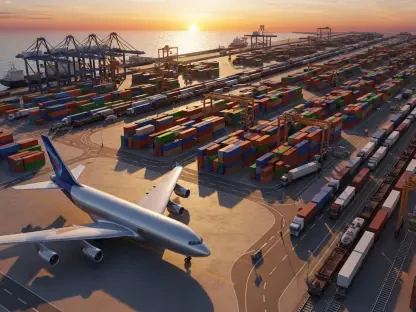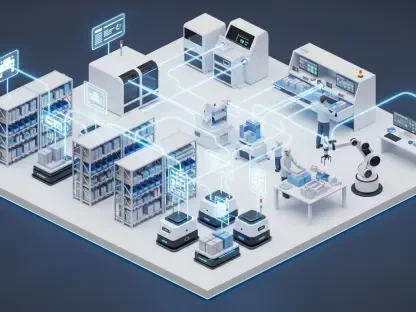In an era where e-commerce drives unprecedented demand for swift and reliable delivery, the final-mile sector stands at the forefront of logistics innovation, grappling with the challenge of meeting consumer expectations for speed and precision. Imagine a world where a package ordered online arrives at a doorstep within hours, seamlessly navigating through urban congestion and rural expanses alike. This scenario is no longer a distant dream but a pressing reality that companies like ADL Final Mile are striving to perfect through strategic expansions and acquisitions. The recent integration of DMC Logistics into ADL Final Mile’s portfolio exemplifies a bold step toward redefining regional delivery capabilities in the United States, setting the stage for a deeper exploration of how such moves reshape the logistics landscape.
Overview of the Final Mile Delivery Industry
The final-mile delivery sector serves as the critical last step in the logistics chain, ensuring that goods reach consumers’ hands directly from warehouses or distribution centers. This segment has become increasingly vital with the surge in e-commerce, as businesses aim to satisfy customer demands for rapid delivery, often within the same day. Major players in this space, including national carriers and specialized regional providers, are under constant pressure to optimize their networks to handle growing order volumes while maintaining efficiency and cost-effectiveness.
Technological advancements are transforming the industry, with innovations such as route optimization software and real-time tracking systems enhancing operational transparency and speed. These tools allow companies to streamline delivery routes, reduce fuel consumption, and provide customers with accurate updates on package status. Additionally, the integration of automation and data analytics helps predict demand spikes, enabling better resource allocation during peak seasons like holiday shopping periods.
Consumer expectations continue to evolve, pushing the boundaries of what final-mile delivery can achieve. The desire for faster, more flexible delivery options has led to a competitive race among providers to offer services like same-day or even two-hour delivery windows. This trend underscores the importance of a robust and adaptable logistics network, capable of meeting these high standards while navigating challenges such as urban traffic constraints and last-minute order surges.
Strategic Importance of the DMC Logistics Acquisition
Expanding Geographic Reach and Operational Footprint
The acquisition of DMC Logistics marks a significant milestone for ADL Final Mile, extending its operational presence across 27 states with a network of 88 company-managed distribution locations. This expansion strengthens the company’s ability to serve a broader customer base, particularly in regions previously outside its core coverage. The move is a strategic effort to build a more comprehensive national footprint, ensuring that final-mile services are accessible in diverse markets.
Specifically, DMC Logistics brings expertise and infrastructure in the Southwest, covering key states such as New Mexico, Arizona, Colorado, Nevada, Texas, and Utah. This regional focus is crucial, as the Southwest presents unique logistical challenges and opportunities due to its vast distances and growing population centers. By incorporating these areas into its network, ADL Final Mile positions itself to tap into emerging markets and meet the rising demand for efficient delivery solutions in these high-growth zones.
The expanded footprint also enhances the company’s ability to offer localized services tailored to regional needs. With a stronger presence in the Southwest, ADL Final Mile can reduce delivery times and improve responsiveness, providing a competitive edge in a market where speed is paramount. This geographic diversification is a calculated step toward building resilience against regional disruptions and ensuring consistent service quality across varied landscapes.
Enhancing Service Capabilities and Expertise
Integrating DMC Logistics into ADL Final Mile’s operations brings a wealth of customized final-mile services that complement existing offerings. DMC’s specialized approach to logistics, honed through years of regional experience, adds depth to ADL Final Mile’s portfolio, allowing for more tailored solutions that address specific customer pain points. This synergy is expected to elevate the overall value proposition for clients seeking reliable and adaptable delivery options.
A key element of this integration is the retention of Steve Griego, the founder and former president of DMC Logistics, who now serves as the president for the Southwest Region at ADL Final Mile. His deep understanding of local market dynamics and established relationships with regional stakeholders ensure continuity in service excellence. Griego’s leadership is poised to facilitate a smooth transition and drive strategic initiatives that align with the broader goals of the company.
This acquisition not only bolsters service capabilities but also enriches the expertise within ADL Final Mile’s ranks. By combining the strengths of both entities, the company can offer a more comprehensive suite of solutions, ranging from standard parcel delivery to complex, industry-specific logistics requirements. Such enhancements are vital in a competitive landscape where differentiation through service quality and customization is a key driver of customer loyalty.
Challenges in Scaling Final Mile Delivery Operations
Scaling operations through acquisitions like that of DMC Logistics presents several hurdles for ADL Final Mile, particularly in aligning disparate operational systems and cultures. Ensuring that processes across newly integrated regions are standardized without compromising service quality requires meticulous planning and execution. Missteps in this area could lead to inefficiencies or customer dissatisfaction, undermining the benefits of expansion.
Beyond internal integration challenges, the final-mile delivery sector faces broader obstacles such as labor shortages, which impact the ability to maintain a reliable workforce during peak demand periods. Rising fuel costs further strain operational budgets, necessitating innovative approaches to route planning and vehicle efficiency. Moreover, the growing expectation for same-day delivery adds pressure to already tight schedules, demanding agile responses to fluctuating order volumes.
To navigate these issues, companies often turn to strategies like investing in technology for better workforce management and predictive analytics to anticipate demand trends. Partnerships with local contractors can also alleviate labor constraints, while adopting fuel-efficient fleets or alternative energy vehicles may help mitigate cost pressures. For ADL Final Mile, addressing these challenges proactively will be essential to sustaining the momentum gained from its recent acquisition and maintaining a competitive stance in the market.
Financial Backing and Industry Consolidation Trends
The aggressive growth strategy of ADL Final Mile is underpinned by substantial financial support from RD Last Mile Holdings LLC, backed by entities such as Red Dog Equity, Monroe Capital, and the family business interests of billionaire Tom Pritzker. This robust capital base provides the necessary resources for acquisitions and operational investments, enabling the company to pursue an ambitious expansion agenda. Such backing is a testament to the confidence investors have in the potential of the final-mile delivery sector.
Industry-wide, consolidation has emerged as a dominant trend, with companies seeking to achieve economies of scale and broader regional coverage to meet the demands of e-commerce-driven markets. Mergers and acquisitions allow firms to pool resources, share technological advancements, and reduce redundancies, thereby enhancing overall efficiency. This pattern of consolidation reflects a strategic recognition that larger, more integrated networks are better equipped to handle the complexities of modern logistics.
For ADL Final Mile, this trend aligns perfectly with its current trajectory, as evidenced by multiple acquisitions since its formation. The financial muscle provided by its investors positions the company to continue this path, potentially targeting additional regional players to further solidify its market presence. As the logistics sector evolves, such strategic moves are likely to define the competitive hierarchy, with scale becoming a critical determinant of success.
Future Outlook for ADL Final Mile and the Logistics Sector
Looking ahead, ADL Final Mile stands to benefit from further growth opportunities, potentially through additional acquisitions that complement its existing network. Expanding into untapped markets or deepening penetration in current regions could amplify its reach and service diversity. Moreover, strategic partnerships with technology providers may accelerate the adoption of cutting-edge tools, enhancing operational efficiency and customer satisfaction.
Investment in automation and digital platforms is another promising avenue, as these technologies can streamline processes like sorting, tracking, and delivery scheduling. The broader logistics industry is witnessing a shift toward greater reliance on such innovations, driven by the need to manage escalating order volumes and complex delivery requirements. For ADL Final Mile, staying ahead of this curve will be crucial to maintaining a leadership position in a rapidly changing environment.
Industry trends also point to sustained e-commerce growth, which will continue to fuel demand for final-mile services. Shifting consumer preferences toward faster, more transparent delivery experiences are reshaping service models, with an emphasis on flexibility and reliability. As these dynamics unfold, ADL Final Mile and its peers must adapt by prioritizing customer-centric innovations and robust infrastructure development to meet future expectations effectively.
Conclusion: Implications of ADL Final Mile’s Expansion Strategy
Reflecting on the journey so far, the acquisition of DMC Logistics by ADL Final Mile stands as a pivotal moment that significantly broadened its geographic and operational scope in the U.S. logistics market. This strategic move highlighted the power of targeted expansions in building a formidable presence within the competitive final-mile delivery arena. It also underscored the value of integrating regional expertise to enhance service delivery.
Moving forward, a critical next step involves leveraging the combined strengths of both entities to innovate and refine service offerings, ensuring they meet the evolving demands of e-commerce and consumer markets. Exploring further investments in technology to optimize delivery processes emerges as a priority, alongside maintaining a keen focus on operational integration to avoid potential pitfalls. These actions promise to fortify ADL Final Mile’s standing in the industry.
Additionally, industry stakeholders need to consider fostering collaborations that could drive systemic improvements in logistics efficiency, such as shared infrastructure models or joint technology initiatives. Such steps hold the potential to address common challenges like cost pressures and labor constraints, paving the way for a more resilient sector. The path ahead for ADL Final Mile and similar players hinges on balancing growth ambitions with sustainable practices to ensure long-term success.









